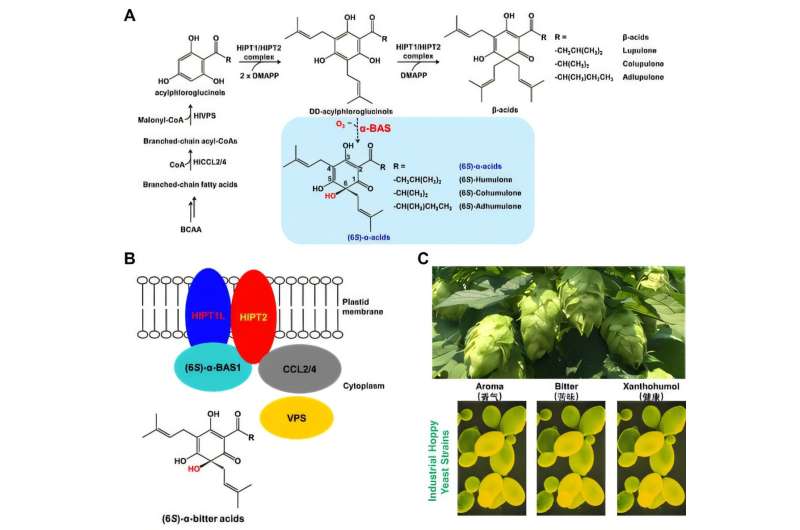Science
Researchers Uncover Key Enzyme in Hops for Beer Flavor

Hops play a critical role in beer production, providing its signature flavor and aroma. A recent study led by Prof. Wang Guodong from the Institute of Genetics and Developmental Biology of the Chinese Academy of Sciences has revealed the enzyme responsible for synthesizing α-bitter acids—an essential component that contributes to beer’s characteristic bitterness. This breakthrough has significant implications for both the brewing industry and the understanding of plant biosynthesis.
While the upstream biosynthetic pathway for α-bitter acids has been well-documented, the final step remained elusive for over a decade. The enzyme known as α-bitter acid synthase (α-BAS) had not been functionally verified, despite the identification of several candidate genes. The research team utilized a highly sensitive liquid chromatography–mass spectrometry (LC–MS) detection method to differentiate between the two chiral forms of α-bitter acids—6S and 6R.
Their findings, published in Plant Communications, demonstrated that hop glandular trichomes primarily accumulate the 6S-type α-bitter acid. Further research revealed that the precursor, deoxy-α-bitter acid, oxidizes when exposed to air, forming a racemic mixture of the two types. This spontaneous reaction had complicated efforts to confirm the function of α-BAS.
To overcome this challenge, the researchers established a yeast heterologous expression system and systematically tested over ten candidate genes. The results identified HlMO18 as the enzyme that specifically catalyzes the conversion of deoxy-α-bitter acid into the predominantly produced 6S form. Key amino acid residues crucial for the enzyme’s activity were also identified.
Further mechanistic analyses showed that 6S-type α-bitter acid synthase forms a metabolic complex with upstream enzymes, explaining why only the 6S form accumulates in hop glandular trichomes. This research completes the biosynthetic map of α-bitter acids in hops, providing essential insights for the brewing industry.
The implications of this discovery extend beyond understanding hops. The researchers aim to leverage synthetic biology to engineer industrial yeast strains capable of producing “hoppy beer,” which retains authentic hop flavors without using actual hop plants. This innovative approach could potentially lower production costs and allow for a greater variety of customized, flavor-rich beers.
By elucidating the biosynthetic pathways of the three major flavor compounds in hops, this study paves the way for advancements in beer production. As the brewing industry continues to evolve, these findings represent a significant step towards enhancing flavor profiles and improving efficiency in beer manufacturing.
For further details, refer to the study by Chengyong Feng and colleagues, titled “A flavin-dependent monooxygenase favors the formation of (6S)-α-bitter acids in hop glandular trichomes,” published in Plant Communications in 2025.
-

 Top Stories2 weeks ago
Top Stories2 weeks agoMarc Buoniconti’s Legacy: 40 Years Later, Lives Transformed
-

 Sports3 weeks ago
Sports3 weeks agoSteve Kerr Supports Jonathan Kuminga After Ejection in Preseason Game
-

 Entertainment3 weeks ago
Entertainment3 weeks agoZoe Saldana Advocates for James Cameron’s Avatar Documentary
-

 Business3 weeks ago
Business3 weeks agoTyler Technologies Set to Reveal Q3 2025 Earnings on October 22
-

 Science3 weeks ago
Science3 weeks agoChicago’s Viral ‘Rat Hole’ Likely Created by Squirrel, Study Reveals
-

 Politics3 weeks ago
Politics3 weeks agoDallin H. Oaks Assumes Leadership of Latter-day Saints Church
-

 Lifestyle3 weeks ago
Lifestyle3 weeks agoKelsea Ballerini Launches ‘Burn the Baggage’ Candle with Ranger Station
-

 Lifestyle3 weeks ago
Lifestyle3 weeks agoDua Lipa Celebrates Passing GCSE Spanish During World Tour
-

 Health3 weeks ago
Health3 weeks agoCommunity Unites for Seventh Annual Mental Health Awareness Walk
-

 Health3 weeks ago
Health3 weeks agoRichard Feldman Urges Ban on Menthol in Cigarettes and Vapes
-

 Business3 weeks ago
Business3 weeks agoMLB Qualifying Offer Jumps to $22.02 Million for 2024
-

 Sports3 weeks ago
Sports3 weeks agoPatriots Dominate Picks as Raiders Fall in Season Opener









